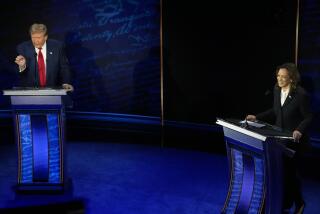For once, Romney becomes target of GOP rivals at debate
Reporting from Concord, N.H. — In the most contentious debate of the GOP presidential campaign, Mitt Romney got a long-anticipated pummeling from his Republican rivals Sunday morning, just two days ahead of the New Hampshire primary.
The Republican front-runner had floated above the fray less than 12 hours earlier, in an another network debate. But when he joined the rest of the GOP contenders on NBC’s “Meet the Press” for a rare morning confrontation, he found himself on the receiving end of a fusillade of attacks -- for his shape-shifting on issues, his political ambitions and his record as governor of next-door Massachusetts.
“Can we drop a little bit of the pious baloney?” Newt Gingrich asked after Romney contended that, unlike others on the stage, he wasn’t a career politician. Gingrich pointed out that Romney had run for the U.S. Senate in 1994 and for the presidency in 2008, losing both times.
“You’ve been running consistently for years and years and years,” Gingrich said. “So this idea that suddenly citizenship showed up in your mind -- just level with the American people.”
The former House speaker labeled Romney a “timid Massachusetts moderate” and predicted he would have “a very hard time” defeating President Obama if he became the GOP nominee.
The withering remarks came as Romney proudly boasted that he had “not been a lifetime politician” and that “for me, politics is not a career.”
“I went to Massachusetts to make it different. I didn’t go there to begin a political career, running time and time again,” he said. “Run again? That would be about me.”
Rick Santorum, the fastest rising GOP contender, accused Romney of bailing out on the people of his state when he ran for president instead of seeking reelection when his gubernatorial term ended in 2007. The former Pennsylvania senator also said that while he was winning election in Pennsylvania in 1994, Romney “ran from Ronald Reagan” and “said he’d be to the left of Ted Kennedy on gay rights, abortion, a whole host of issues” as he tried to unseat the liberal Democratic senator.
Romney, who argues that his experience as a private-equity executive makes him best qualified to lead the country back to prosperity, said he had learned from his experiences in politics, including his 2008 loss to John McCain in the Republican presidential race.
“Frankly, it’s made me more conservative as time goes on,” Romney said.
Ron Paul zeroed in on Romney’s record. “I don’t see how we can do well against Obama if we have any candidate -- that, you know, endorsed -- you know, single-payer [healthcare] systems and TARP bailouts and don’t challenge the Federal Reserve. $15 trillion of injection bailing out their friends,” the Texas congressman said, referring to Romney and his background in the financial industry.
Jon Huntsman Jr., running to the left of the field in a longshot bid, reacted sharply after Romney attacked his service as Obama’s ambassador to China and Huntsman’s past praise for the president as “a remarkable leader.”
Huntsman, in his best performance of the debate cycle, responded that “this country is divided … because of attitudes like that,” prompting loud applause from the audience at the Capitol Center for the Arts. “The American people are tired of the partisan division.”
The debate questioners — Meet the Press anchor David Gregory and two veteran local reporters — also got into the act. Romney was asked how he had worked to make good on a 1994 campaign promise to be a voice within the Republican Party to increase support for the gay community.
Romney replied by citing his record of appointing a gay man to his cabinet as governor while reiterating his opposition to same-sex marriage. Pressed by Andy Hiller of Boston’s WHDH-TV to say when he last stood up for gay rights, Romney responded, “Right now.”
Turning to Santorum, who has stirred controversy in recent days with remarks widely seen as hostile to gays, Hiller asked the former senator what he would do if one of his sons informed him he was gay.
“I would love him as much as I did the second before he said it,” Santorum replied, “and do everything to be as good a father to him.”
Texas Gov. Rick Perry, trailing badly here, in South Carolina and the national polls, drew laughter when he referred back to the best-remembered exchange from the debates when he answered a question about three areas he would cut that might cause pain.
“It would be those bureaucrats at the Department of Commerce and -- and Energy and Education -- that we’re going to do away with,” Perry said, the trifecta he failed to complete in his “oops” moment that seems to have doomed his 2012 chances.
The unusual Sunday morning format was the 15th GOP debate of the campaign. The bare-knuckled assault on Romney was a sharp reversal from previous face-to-face encounters.
All of the trailing candidates were widely criticized Saturday night, in post-debate commentary, for failing to capitalize on one of their last real chances to stop Romney, increasingly seen as the likely nominee. Santorum, in particular, was thought to have muffed a rare opportunity to build on his newfound prominence, after a virtual win in Iowa, by honing his identity as the conservative alternative to the more moderate front-runner.
The debates Saturday and Sunday were staged just 10 hours apart and in different New Hampshire cities, posing something of an endurance test for the candidates.
After the second session ended, Santorum and Perry were headed for South Carolina, a social conservative bastion that holds the first southern primary a week from Saturday. The rest of the contenders scheduled campaign events in New Hampshire leading into Tuesday’s primary.
Santorum has pulled into a tie for second place in national polling with the fading Gingrich. He is hoping to solidify his position as the conservative alternative to Romney, but in New Hampshire polling he’s no better than third behind Paul.
Romney is a prohibitive favorite in New Hampshire, where his lead is roughly 20 percentage points. A Romney victory in South Carolina, where a recent public poll also shows him in the lead, could remove any serious doubt about his ultimate success in the nomination contest.
Party rules, though, dictate a more leisurely decision. It will be April, at the earliest, before any candidate can secure the majority of convention delegates needed to gain the nomination at the GOP National Convention in Tampa in late August.
Many Republicans, including those in the Romney camp, expect one or more of his rivals to continue their campaign beyond the Florida primary on Jan. 31, even if the outcome of the race is no longer in doubt.
The most likely holdout is Rep. Paul, who has a national following and is grooming his son, Kentucky Sen. Rand Paul, to inherit his organization.
Paul, who once ran for president on the Libertarian Party ticket, has also refused to commit to supporting the Republican nominee. He repeated Saturday night that if he doesn’t win he is unlikely to bolt the party, but he refused to rule it out entirely.
“I have no intention. But I don’t know why a person can’t reserve a judgment and see how things turn out,” Paul said.
paul.west@latimes.com; seema.mehta@latimes.com
More to Read
Get the L.A. Times Politics newsletter
Deeply reported insights into legislation, politics and policy from Sacramento, Washington and beyond. In your inbox three times per week.
You may occasionally receive promotional content from the Los Angeles Times.











